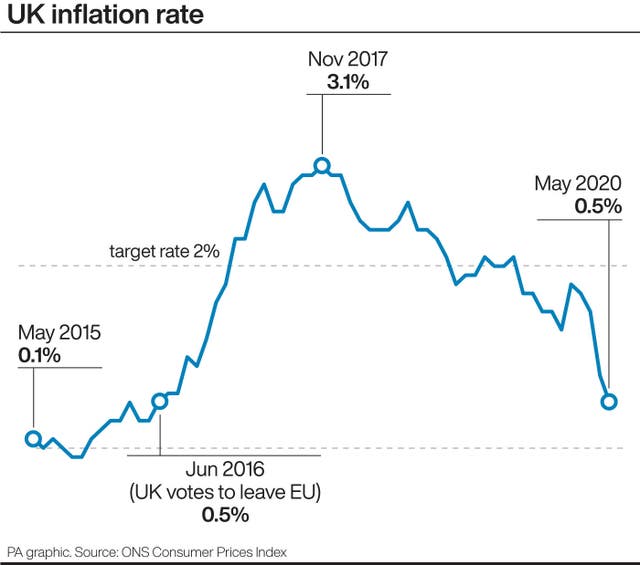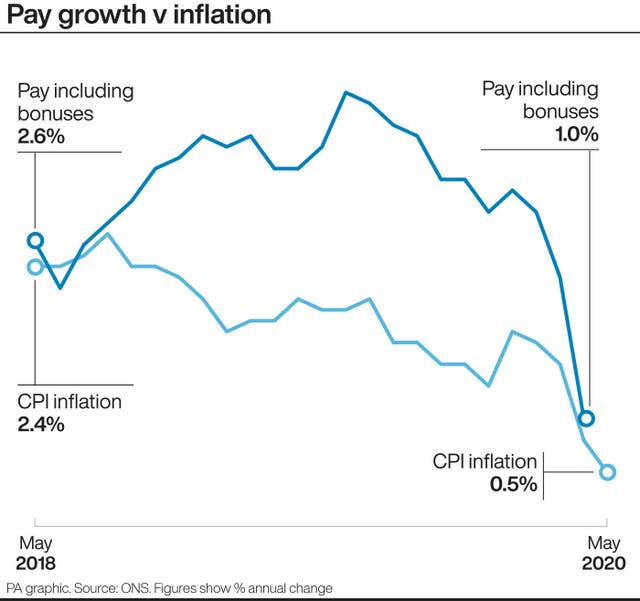Inflation falls to four-year low after record drop in fuel prices amid pandemic
The ONS said the rate of Consumer Price Index inflation fell to 0.5% in May from 0.8% in April.

UK inflation fell to its lowest level in four years last month after a record drop in fuel prices and as clothing and energy costs continued to tumble, official figures have shown.
The Office for National Statistics (ONS) said the rate of Consumer Price Index (CPI) inflation fell to 0.5% in May from 0.8% in April – the lowest since June 2016.
Fuel prices tumbled by 16.7% in May – the biggest fall on record – while energy costs dropped 7% and clothing and footwear prices fell 3.1% as retailers resorted to heavy discounts amid the lockdown.
“There was a continued drop in prices at the pump in May, following the huge crude price falls seen in recent months,” ONS deputy national statistician Jonathan Athow said.

Economists said the further fall in inflation gives the Bank of England room to take more economy-boosting action at its meeting on Thursday, when it is expected to launch at least another £100 billion of quantitative easing (QE).
This follows £200 billion of extra QE announced in March.
But the Bank is set to hold off from more radical action, such as negative interest rates, for now and experts predict it will keep rates unchanged at the all-time low of 0.1%.
The Bank’s decision follows official figures showing the economy plunged by more than a fifth in April as the lockdown brought Britain to a virtual standstill.
Economist James Smith, at ING, said: “We expect headline UK inflation to stay below 1% this year and, given the slack in the jobs market, we’d expect price pressures to stay fairly muted for some time.
“This in turn will keep the pressure on the Bank of England to maintain its current degree of stimulus, and we expect a further £150 billion of QE to be unveiled this week.”
Samuel Tombs at Pantheon Macroeconomics said inflation is likely to fall to near zero in the second half of 2020.
Ultra-low inflation will offer some relief to households amid the crisis, especially after figures on Tuesday showed wages including bonuses rising by just 1% in the three months to April.

The ONS said it was unable to collect prices on 14% of goods and services that were unavailable due to the lockdown, such as foreign holidays and haircuts.
It added that using an alternative basket of goods, which removes items not available, CPI would have been even lower – at 0.4% in May.
The latest inflation data showed that average petrol prices fell to 106.2p a litre last month, while diesel dropped to 113.4p – levels not seen since 2016.
Fuel prices have been falling sharply as the global cost of oil has been hit hard by the coronavirus crisis, with lockdowns worldwide affecting demand, though crude prices began bouncing back last month.
Inflation has also been driven lower in recent months by falling energy prices after regulator Ofgem reduced its default tariff cap.
But food and alcohol prices saw steep rises – up 1.8% and 2.6% respectively – while the cost of toys and games eased back after surging in April as families looked to entertain children in the lockdown.
The data also showed that the Retail Price Index (RPI), a separate measure of inflation, was 1% in May, down from 1.5% in April.
The Consumer Price Index including owner-occupiers’ housing costs (CPIH) – the ONS’s preferred measure of inflation – fell to 0.7% in May from 0.9% in April.





